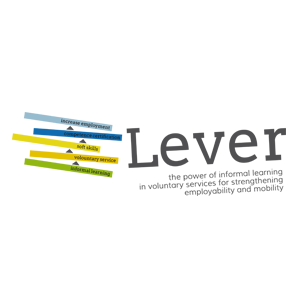“LEVER – Modelling informal learning and transversal competences in the voluntary service experience, to increase employment and mobility of citizens”, is a project organised by Fondazione Politecnico di Milano (Italy) in the years 2015-2016 in cooperation with the following partners:
- A.Vo.P.S. – Volunteering Service Centre Sondrio Province (Italy)
- Confindustria di Sondrio e Lecco (Italy), SNS – Scuola Nazionale Servizi (Italy)
- VPL – Foundation European Centre Valuation Prior Learning
(the Netherlands) - VIA University College (Denmark)
- HOMINEM Challenge SL (Spain)
- Good Network Foundation (Poland)
The project was funded by the Erasmus+ programme.
PROJECT OBJECTIVE
The aim of the project was to create a model and tools that will help organisations and volunteers to develop soft skills that can be useful in the labour market.
PHASES OF THE PROJECT
First, as part of the project, a survey was carried out. One of the aims was to identify local experiences and good practices in recognising competences acquired through non-formal and informal education. It also aimed to identify examples of volunteering programmes which allow volunteers to learn and develop their skills.
Then, the results of the study and experience of the partners,
served as a basis for the development of a handbook which describes the LEVER Model – a procedure of certification of competence, taking local conditions into account. An online platform has also been set up, where all interested volunteers can work through the certification process (in English).
As the LEVER Model is an innovative tool, the project includes a testing phase. This means that in each of the participating countries the following took place:
- A professional training was organised for representatives of NGOs interested in using the LEVER Model to confirm competences of volunteers cooperating with them. Participants of the training received certificates confirming their knowledge of acting as a tutor (a person supporting the volunteer in the certification process) and as an assessor (a person assessing the volunteer’s competency level). Interviews and materials collected by the volunteer served as a basis for confirming their knowledge.
- At least 12 volunteers had an opportunity to use the tool to confirm their competence followed by sharing (with organisers) their experience and suggestions for improvement of the tool.
In Poland, 24 tutors and assessors took part in the testing phase and 23 volunteers successfully passed the certification process.
In the years 2017-2019 the LEVER Model will be developed and popularised throughout Europe as part of another project: “LEVER UP. Valuing informal learning and transversal competences experienced in the voluntary service, to increase employability, social responsibility and mobility”, is coordinated by Fondazione di Milano (Italy).
For more information go to: http://certyfikatlever.pl
[Translation: Małgorzata Smorąg – THANK YOU!]


